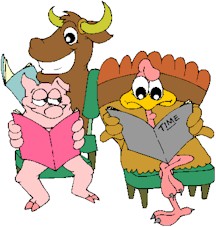All That Glitters
Kim wants to drive her three kids and their two friends to the soccer game. The problem is that her shiny new SUV only has room for five passengers including the driver.Kim misses her old eight passenger SUV but she’s still thankful that the new one gets much better gas mileage.
1. Which of the following statements is false?
a. Kim’s new vehicle is not meant to carry six people.
b. Kim’s old SUV had seating for more passengers than the new one.
c. Kim won’t be able to take her kids to the soccer game.
Karim had $500 dollars to invest. He was considering a number of options.
“I’d really like to buy gold bars with the money and hide them in a big hole in our yard,” he said.
“Five hundred dollars won’t buy much gold,” his father pointed out. “You could put all the gold in your shoe and never notice that it’s there.”
“That takes all the fun out of it!” Karim groaned. “I just won’t buy any gold at all!”
When Karim’s father suggested that he deposit the money in his new savings account at the local bank, Karim quietly stated, “That could work.”
2. What did karim want to buy?
a. new shoes
b. a small gold coin
c. gold bars
d. a used hamburger
3. From the selection we can tell that Karim _______.
a. will save his $500 at the local bank
b. might decide to put his money into his bank account
c. will put the cash under his pillow and wish for a tooth
d. does not trust banks
Scientists in Australia have discovered a planet that seems to be a solid diamond. They estimate it to be about five times the size of Earth. The diamond planet is 4,000 light years away, so don’t plan on traveling there any time soon.
4. Which one of the following do you think scientists needed in order to make this discovery?
a. a microscope
b. a smartphone
c. a jewelery store
d. a radio telescope



